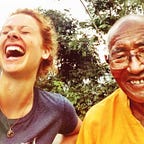I was embarrassed at first, but I took the rose and muttered, “Thank you.” In my mind, I was already anticipating the stares I’d get walking down the street. This made me hesitate before accepting the simple gift. Stares aren’t a new occurrence since I moved to Nepal; I’ve gotten used to eyes watching my every move, from my exercise routine to the groceries I carry from the market. But this was different.
I’m walking on dusty roads with a rose.
It’s Valentine’s Day.
As expected, people are staring. A curious woman asks me where the flower is from. “Is your friend Nepali or ‘Bireshi’ (out of country)?” she presses, but I don’t feel invaded. In fact, I can’t help but smile. Children’s eyes light up as I pass them. Men sheepishly wish me a Happy Valentine’s Day. I’m surprised at how good I feel. This flower has made me feel prized, cherished.
Then I begin to see it: envy.
Women sitting on curbs and in storefronts follow me with their gaze. I hear whispers. I begin to wonder if they’ve ever received a flower. Will anyone wish them a Happy Valentine’s Day? Has someone thanked them for their work? An image flashes in my mind.
Twenty minutes later, I’m bargaining at a flower stand and step into the street, arms filled with roses.
I hand the first flower to a young girl. Our eyes connect from a distance, and a huge grin fills my face when I see her measure the bouquet in my arms. I’m not sure who is more nervous, the girl or me.
Wishing her a Happy Valentine’s Day, I hand her a rose. Her face explodes into brightness. “Same to you,” she gushes. As I walk away, I turn to see the girl share her flower with the woman beside her. They giggle to each other.
Over the next hour, I hand roses to shopkeepers, mothers with babies, teenage girls in groups, shy girls, tired looking girls, grandmothers, women stationed behind counters. Each rose feels slightly easier to present; my anxiety and nervousness slowly subside.
Reactions are similar, bright faces followed by gratitude. I recognize the same feeling I felt: feeling recognized, feeling seen, feeling special.
If I had it my way, I would have stood on the street all day handing out an endless supply of flowers. After the first batch of roses are dispersed, I buy more. I look for weary faces or tired bodies, the girl in the group who looks set apart or unsuspecting.
A teenager rests beside her cart of chatpat (a Nepali street snack; recipes here and here). Something inside me whispers, “Her.” Her hazel eyes brim with warmth and gratitude after receiving the rose.
Two older women step out of a home arm-in-arm. I hand the older woman a rose. Her gentle appreciation is tangible, immediate. Something magical fills the air — a feminine touch of experience and knowledge and years I have yet to live. “Happy Valentine’s Day,” I state simply, and walk away.
Of course I was nervous.
Yes, it was scary approaching strangers on the street! Who knows what these people would think of me? What if she’s offended? What if she thinks I’m pitying her? What if she doesn’t want the flower?
I had to get over my own fear and trust in my intention: We are women, we are sisters, everyone deserves to feel special. It’s a gift, I’m expecting nothing in return. It’s Valentine’s Day.
Two main points to this story:
1. These “stranger roses” happened because one person gave me a rose. This idea would have never crossed my mind if I didn’t feel the power that came from that initial gift. Giving comes from a place of creativity; it requires a release, a letting go, a sharing. That harboring feeling — What if I need it? It’s mine! What if there isn’t enough? — doesn’t doesn’t have a place when creative abundance takes over.
2. A simple exchange can dramatically impact someone’s day. Giving makes you feel good. It’s magic for both giver and receiver. Consider the flower that was given to me and how it completely changed my day. A common language isn’t needed to express — and share — our humanity.
I listened to a Podcast recently that pinpoints fear in these moments we connect, when we open ourselves to experience. The times we become vulnerable are the times we connect.
I can tell you that just two of the smiles I witnessed today were worth my discomfort. (Fortunately for me, I saw more than two smiles.)
If only we’d scare ourselves more often.
